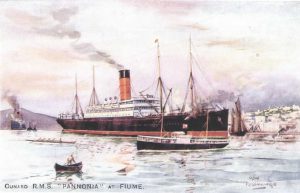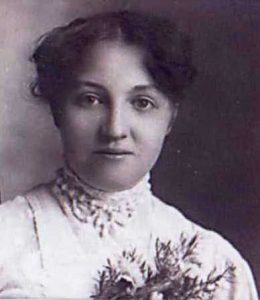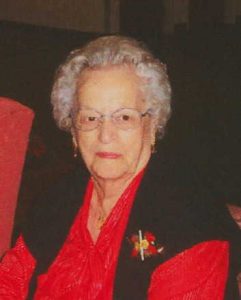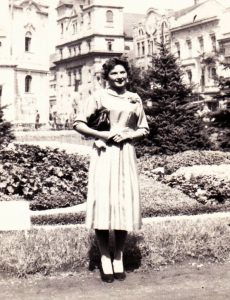
One of my perennial and poignant brick walls is the story behind my wife Nancy’s maternal grandmother Anna Barkassy Pouget (1883–1921). Annie, as she is often called, arrived from Hungary with her father Andràs, an attorney, and passed through Ellis Island on 30 January 1906.[i] Annie’s story is like that of many other turn-of-the-twentieth-century Ellis Island immigrants in that her family name offers only a limited sense of her identity.[ii] Annie and her father traveled together; the passenger manifest reflects scant clues as to who or what they might be leaving behind in the old country – and negligible information regarding their business here on arrival.

Not long after arriving in New York, Annie married Jean-Baptiste Pouget (1882–1964), an adventurous and hard-working young expatriate from Belgium.[iii] After her father’s passing, Annie and John made their way west to California’s Napa Valley and began to raise their family of five children. Life was not easy, but those early days in California must have been full of love and laughter, of growing children, and of great promise.
Destiny had other plans. In 1921, Annie passed away in San Francisco just shy of her thirty-ninth birthday.[iv] The medical knowledge at the time simply couldn’t save this young mother’s life. John Pouget, left with five little children, was going to have to work hard to keep it all together. I might add here that John did a great job. My mother-in-law Pearl Pouget was their fifth and Annie’s last child.

In the late 1990s, Annie’s daughter and my wife’s mother, now Mrs. Pearl Bloodgood (1918–2008), came to our home for a visit. Pearl loved family, and being around Pearl provided for many good and in-depth conversations on any number of topics. While I can’t be certain how we came to the discussion, I rather think it must have been about the time that Pearl and I were both ruminating over the high and increasing cost of goods and services wherever one went. At this point in the conversation, Pearl casually said to Nancy and me, “Well, things would have been a lot easier for us all if I had been able to get that railroad inheritance…”
“….Mom, what railroad inheritance!?!”
This was certainly the first anyone had ever heard of a “railroad,” let alone one connected to a foreign inheritance. Pearl went onto explain that in the 1930s her father John Pouget had been contacted by now-unknown parties in Hungary explaining that an unmarried and childless uncle of Annie’s had passed away leaving the monies from “his railroad” to the children of his siblings. Pearl added that the children were required to be in their majority to receive this money. She said these events occurred prior to her twenty-first birthday in May of 1939, and recalls that her father worked diligently with a former Napa County judge to get all the paperwork filed internationally, so that funds could be disbursed.[v] Pearl’s twenty-first birthday was one of the last hurdles to overcome.
Needless to say this never happened. The world became embroiled in war, limiting every form of overseas communication. Hungary proved to be no exception, and my mother-in-law’s inheritance disappeared behind enemy walls. Communications with Hungarian authorities or family representatives came to a halt. Time moved on through the Nazis and into the era of the Iron Curtain. Not much changed, that is until curious communications began to arrive from Hungary in the early 1960s from Annie’s and Pearl’s cousins. And while there is no record of these messages, Pearl told of how her cousins were trying desperately to get out of their native land.

Pearl explained that her now-elderly father John Pouget had wanted to help them, but his resources were limited. In the end, Mr. Pouget had to wish them well – but turn them away. He could only remind them of the “railroad inheritance” and tell them to “take it all” (if they could get it), using it to escape.
As a family historian I’ve attempted to learn what I can about the Hungarian railroad system of the early twentieth century. With reasonable certainty I can say that the railroad was government-owned, but that certain “rail lines,” i.e., tracks or throughways, were privately owned.[vi] And while it doesn’t look like we will be inheriting any rail lines connecting to the Orient Express anytime soon, I have tried in earnest to identify the characters in this story – from the Napa County judge who tried to help John with the inheritance for Annie’s children to the nameless faces trapped behind the Iron Curtain. [vii]
I hope one day I can discover some answers for us all.
Notes
[i] Passenger Record for Anna Barkassy, American Family History at Center Ellis Island, arrival date 30 January 1906.
[ii] Hungarian Noble Families, “Magyar nemes csaladok” (www.arcanum.hu), for an ancient pedigree of “Barkassy.”
[iii] New Jersey, Marriage Index, 1901-1914, Ancestry.com, for the Barkassy-Pouget marriage 7 November 1907.
[iv] University of California Hospital, San Francisco, certified copy of death record for “Annie Pouget” 1 December 1921; Annie’s cause of death is listed as “shock following an operation for nephrectomy.”
[v] “Judge Snow” as described by Pearl Pouget Miller Bloodgood, seems to be one and the same with former Napa County Justice of the Peace Charles H. Snow (1877–1967), who was not only blind but produced more than 200 novels. See The Oakland Tribune, 3 December 1922, 59, and The Santa Rosa Press Democrat, 26 December 1944, 11.
[vi] D. McArthur, Foreign Railways of the World, Railway Register 1884, 1: 139.
[vii] Unmarked family photographs of Hungarian origin dating from the 1880s to the 1960s belonging to Anna Barkassy and Jean-Baptiste Pouget, and now in possession of their granddaughter Nancy Bloodgood Record.
Scams like that one have been going on forever. One of my fringe “uncles” back in the 1860’s “inherited” a fortune in England. Even went over there to get it. No fortune ever made it into his pocket. I could kick myself for not saving that story when I found it. I don’t even know which newspaper it was in. If you find a Bailey going to England to claim his inheritance, he’s sort of mine.
That’s what occurred to me too. A precursor to Nigerian widows with no children, who will take care of all modalities.
Keep on dancing, Jeff. Sure would be nice if someone in the family could turn an inheritance in our direction. Like the Uncle who came to California to seek his fortune in gold–what ever happened there? Nancy’s women folk are beautiful women.
My 2G Great grandmother, Maria Dorothea Wilhelmine Dennewitz (1811-1884), was thought to be one of the heirs of a great uncle who had a Whaling Fortune. She, with her husband, Johann Gottlieb Abicht, came from Thuringen, Prussia, settling in Yankeetown, Ross Co., Ohio, in 1853. As late as the 1890s the family story persisted and an attorney was hired to recover the fortuen for the heirs. There was even a story in a Chillicothe newspaper about the uncle who had died in 1827 in Germany and his estate went to the Crown Church at Straslund. The fortune, depending on who was telling the story, had a value of some 5 to 15 million dollars. No records of any such fortune were found by the attorney, but it sure was a good story.
I too have family oral histories I seek to corroborate with primary sources. I have succeeded with some and continue the search with others. My experiences have shown me the stories are typically a distortion of the facts, and sometimes are used to cover an unpleasant truth. Good luck, keep us posted on your discoveries.
Jeff, I hope you will be able to find the records to complete this story. Have you checked for records of the U.S. consulate in Hungary or of a Hungarian consulate here, perhaps in San Francisco?
I have a story of a childless couple who willed their estate to the children of their siblings. My great grandparents were double recipients because the wife in the childless couple was an aunt of my great grandmother and the husband was an uncle of my great grandfather. I have photocopies of the joint will of the childless couple (from the archives in Stuttgart) and of the documents sent back and forth from and to Germany to identify the heirs in America (a family member’s copies of letters sent by the U.S. consulate in Stuttgart and back via the German Consulate in Chicago).
(cont. from above) I think that the inheritance was distributed just before World War I. Unfortunately for the recipients in Germany, the funds lost their value in the hyperinflation following WWI, according to a German cousin who is a descendant of one of the nieces and nephews of the childless couple. Another interesting aspect of my story is that the “fortune” of the childless couple derived from gold found prospecting in the western U.S. after the Civil War.
(cont. from above) The childless couple immigrated to Missouri in 1847. They returned to their home in Württemberg by 1885, the date of their joint will. In the 1860 census the real estate of the husband was valued at $4000 and his personal estate at $200. In the 1870 census, his real estate was valued at $1000, and no amount was stated in the column for his personal estate. One story is that he sent the first gold nugget he found to his widowed mother in Württemberg and that she used it to purchase the shroud to be used in her burial.
Jan, what a great idea regarding the Hungarian consulate – one I will definitely follow up on. Many thanks!
As you no doubt perceived, the 1960s cousin is a very close image of Anna. The genes ran true, so the story may indeed run similarly. Check the National Archives, re records of foreign consulates ore governments stored there after 1939; the NA has a lot of stuff we can’t even guess at. Best wishes on finding your wife’s Hungarian cousins. Start looking at Hungarian vacation spots for that “old country” visit. Keep us up-to-date.
Robert, you are most kind. I appreciate the ideas and the encouragement!
A great read! Thank you for sharing.
Though it may take time as have the precious works of art, and lands in the countryside with homes and buildings boarded shut across Eastern Europe, while waiting for records, so courts can decide who are the rightful owners, keep trying, if it doesn’t come to fruition, you’ll still be able to create a history of the railroad.